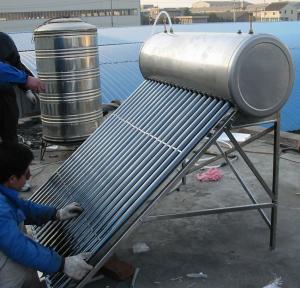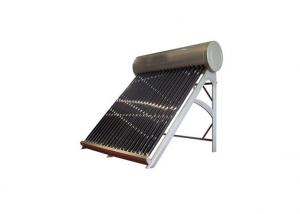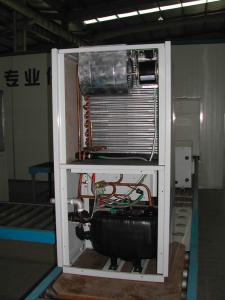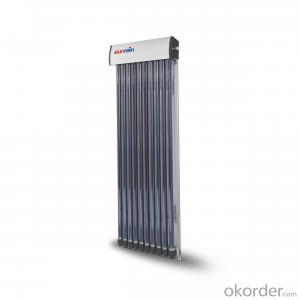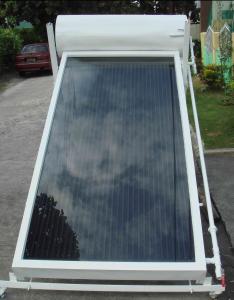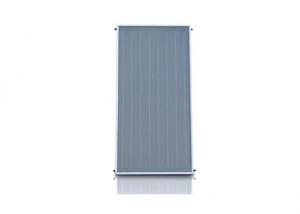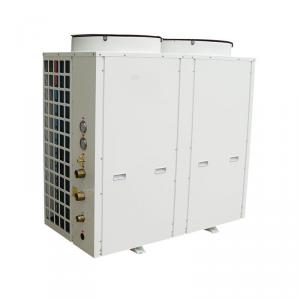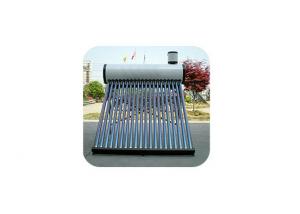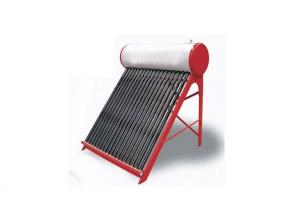Vacuum 20 Tube Solar Collector China Top Supplier
- Loading Port:
- China main port
- Payment Terms:
- TT OR LC
- Min Order Qty:
- 10 set
- Supply Capability:
- 10000 set/month
OKorder Service Pledge
OKorder Financial Service
You Might Also Like
Solar water heaters features
1. The upright tank can make the water temperature to a high level. It can hot the water instantly
2. The tank inside the building, the hot water loses less energy than the normal one
3. The solar collector and the tank of solar water heater is separated, that makes the system combine with the building perfectly, which will reduce the sightseeing for the building and environment around
4. Back up with electric heater so that in the day without sunshine hot water can also be used
5. Can be combined with gas or electric heater
6. Max. Pressure: 12bar; Operating Pressure: 6 bar
7. It can be used for other function, such as warming
Solar water heaters working principle
1. The solar collector absorbs solar energy and transmits it to the solar water heater tank through circulation
2. When the temperature of the collector reaches the set value, the controller starts the circulation pump automatically
3. The circulation pump makes heat-conducting liquid circulate automatically
4. The heat-conducting liquid transfers heat to water by lower heat exchanger in the water tank.
5. When the temperature difference between solar collector and heat pipe solar water heaters tank doesn't reach the set value, the circulation pump will be shut automatically
6. In case the temperature of the water tank does not reach Tmax, Electric Heating Element will start to work automatically
Solar water heaters working station component:
1. Operating screen
2. Manometer
3. Pump speed adjust switches
4. Temperature difference circulation pump
5. Flow rate indicator
6. Return circuit connector
7. Safety valve
8. Expansion vessel connector9. Return circuit connector
10. Wall mounting
11. Expansion vessel:8L
12. Pressure resistance: 10 bar pressure for expansion vessel
Solar water heaters specification:
Description | solar water heaters |
Material of out manifold | 0.55mm thickness color steel/ fluorine carbon steel |
Material of inner tank | Food grade 2.0 mm thickness SUS304 stainless steel |
Tank insulating layer | 40mm 45kg/m³ high-density polyurethane foamed |
Inlet and outlet hole | Male G1'' |
Max pressure | 0.6 Mpa |
Solar collector tube | 3.3 Borosilicate glass with N/Al coating |
Thickness of glass tube | 1.6mm |
Vacuum tube tightness | P≤0.005 Pa |
Absorption | as=0.93-0.96 (AM1.5) |
Emission ratio | εh=0.04-0.06 (80C±5C) |
Idle sunning property parameters | Y=220~260m2.C/KW |
Average heat loss coefficient | ULT=0.6~0.7W/(m2.C) |
Bracket: | 2.0mm thickness aluminum alloy |
Tank weight | 75KGS |
Tank size | 560mm Dia x 1810mm Height |
Tank capacity | 300L |
Solar collector | 2pcs 58x1800x15tube solar collector |
Absorber area | 2.811 m² |
Working station | SP116 working station |
Heat exchanger length | Upper:12m, Underside:18m |
Solar water heaters details show:
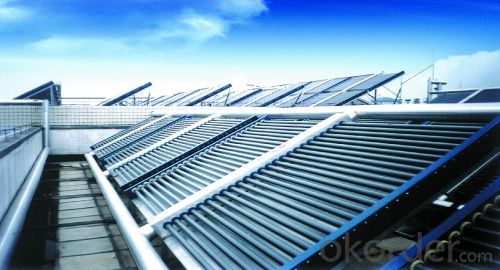
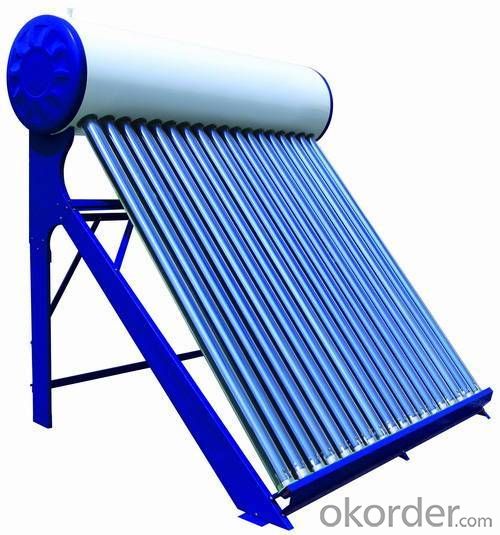
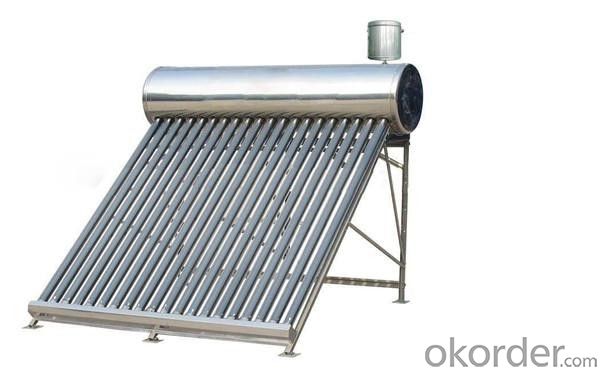
Benefits of this kind of solar water heaters:
1. Prolong the life of your existing water heater
2.Costs less than an electric, gas or oil water heater
3.No maintenance required
4.Lasts longer than a traditional hot water heater
5.Reduce your water heating costs
- Q:What is the cost of installing a solar water heater?
- The price of setting up a solar water heater can differ based on several factors, such as the system's size and type, the installation's location, and any necessary additional equipment or accessories. Typically, the expense of a solar water heater installation can range from $2,000 to $7,000. This covers the cost of the solar panels, the water storage tank, the plumbing and installation labor, and any required permits. It's important to acknowledge that although the initial cost of installing a solar water heater may appear steep, it can result in significant long-term savings on energy bills. Solar water heaters are extremely efficient and can reduce water heating expenses by 50-80% compared to conventional electric or gas-powered water heaters. Furthermore, there might be potential incentives or tax credits offered at the local, state, or federal level that can help offset the installation cost. It is advisable to conduct research and seek advice from local solar energy providers or government agencies to explore any available financial incentives. All in all, the price of installing a solar water heater can differ, but it is a worthy investment that can provide both financial savings and environmental advantages in the long term.
- Q:Can a solar water heater be used in areas with high levels of electromagnetic interference?
- Certainly! Solar water heaters can be utilized in regions with significant electromagnetic interference. The main source of heat for these water heaters is solar energy, hence they are not dependent on or generate electromagnetic signals. Provided that the solar panels are adequately shielded and grounded, they will remain unaffected by any electromagnetic interference present in the vicinity. It is advisable to seek guidance from a skilled installer to guarantee correct installation and protection of the solar water heater system against any potential interference.
- Q:Can a solar water heater be used in areas with limited installation options?
- Yes, a solar water heater can be used in areas with limited installation options. Solar water heaters can be installed on rooftops, terraces, or even ground-mounted in open areas. They are flexible in terms of installation and can be adapted to fit various space constraints. Additionally, there are different types of solar water heaters available, such as integral collector-storage systems or thermosiphon systems, which may offer more installation options depending on the specific requirements of the area.
- Q:How does a solar water heater compare to a traditional electric or gas water heater?
- The energy source and overall efficiency of a solar water heater differ greatly from those of a traditional electric or gas water heater. To begin with, a solar water heater relies on the sun's energy to heat the water, while traditional electric or gas water heaters depend on electricity or natural gas. This distinction gives solar water heaters a significant advantage as they are powered by a renewable and cost-free energy source, making them more environmentally friendly and economically advantageous in the long term. Additionally, operational costs for a solar water heater are typically lower compared to traditional water heaters. Once the initial investment is made, ongoing costs are minimal since solar energy is free. Conversely, electric and gas water heaters require a continuous supply of energy, which can result in higher utility bills. Furthermore, solar water heaters generally exhibit higher efficiency than traditional water heaters. They can be designed to maximize heat absorption and minimize heat loss, leading to improved performance and faster heating times. This efficiency ensures a greater supply of hot water, even on days when solar energy may be less available due to cloudy or rainy weather. Nonetheless, solar water heaters have certain limitations in comparison to electric or gas water heaters. They are reliant on sunlight, so their performance may be diminished in areas with limited sunlight or during winter months. Moreover, solar water heaters necessitate sufficient roof space or designated areas for installation, which may not be feasible for all households. In conclusion, a solar water heater offers numerous advantages over traditional electric or gas water heaters, including lower operating costs, higher efficiency, and a more environmentally friendly energy source. Nevertheless, it is important to consider the limitations based on climate conditions and available space before determining the most suitable type of water heater for a particular household.
- Q:What is the average payback period for a solar water heater in different regions?
- The average payback period for a solar water heater can vary depending on several factors such as the initial cost of installation, local energy prices, available incentives, and regional climate conditions. Generally, the payback period for a solar water heater ranges from 2 to 7 years. However, it is important to note that this can differ significantly between regions, with some areas experiencing shorter payback periods due to higher solar radiation and lower energy costs, while others may have longer payback periods.
- Q:Can a solar water heater be used in areas with limited access to grid electricity?
- Yes, a solar water heater can be used in areas with limited access to grid electricity. Solar water heaters rely on the energy from the sun to heat water, making them a viable option in locations where grid electricity is not readily available. By harnessing solar power, these systems can provide hot water without relying on traditional electricity sources, providing a sustainable and efficient solution for areas with limited access to the grid.
- Q:Can a solar water heater be used in areas with limited access to energy efficiency standards?
- Yes, a solar water heater can be used in areas with limited access to energy efficiency standards. Solar water heaters rely on the sun's energy to heat water, making them an environmentally friendly and cost-effective option for areas with limited access to traditional energy sources. They do not require a connection to the electrical grid or other energy efficiency standards, making them suitable for off-grid or remote locations.
- Q:Are there any safety concerns with using a solar water heater?
- Yes, there are some safety concerns associated with using a solar water heater. These concerns primarily relate to the risk of scalding or burns from hot water, especially if the temperature is not properly regulated. Additionally, there may be electrical hazards during installation or maintenance if not handled by professionals. However, with proper installation, maintenance, and adherence to safety guidelines, these concerns can be effectively addressed and minimized.
- Q:Can a solar water heater be used in areas with limited access to environmental impact assessments?
- Yes, a solar water heater can be used in areas with limited access to environmental impact assessments. Solar water heaters are a sustainable and environmentally friendly option for heating water as they utilize energy from the sun. Since they do not rely on fossil fuels, their environmental impact is significantly lower compared to conventional water heating methods. However, it is still essential to ensure that the installation of solar water heaters complies with local safety regulations and guidelines to avoid any potential negative impacts on the environment or surrounding communities.
- Q:Are there any environmental benefits of using a solar water heater?
- Yes, there are several environmental benefits of using a solar water heater. Firstly, solar water heaters utilize renewable energy from the sun, reducing the dependence on fossil fuels and decreasing greenhouse gas emissions associated with traditional water heating methods. Additionally, they have a smaller carbon footprint as they do not require electricity or gas to operate, resulting in lower overall energy consumption. Lastly, solar water heaters help conserve water by reducing the need for traditional water heating methods that often involve water wastage.
1. Manufacturer Overview |
|
|---|---|
| Location | |
| Year Established | |
| Annual Output Value | |
| Main Markets | |
| Company Certifications | |
2. Manufacturer Certificates |
|
|---|---|
| a) Certification Name | |
| Range | |
| Reference | |
| Validity Period | |
3. Manufacturer Capability |
|
|---|---|
| a)Trade Capacity | |
| Nearest Port | |
| Export Percentage | |
| No.of Employees in Trade Department | |
| Language Spoken: | |
| b)Factory Information | |
| Factory Size: | |
| No. of Production Lines | |
| Contract Manufacturing | |
| Product Price Range | |
Send your message to us
Vacuum 20 Tube Solar Collector China Top Supplier
- Loading Port:
- China main port
- Payment Terms:
- TT OR LC
- Min Order Qty:
- 10 set
- Supply Capability:
- 10000 set/month
OKorder Service Pledge
OKorder Financial Service
Similar products
New products
Hot products
Hot Searches
Related keywords
